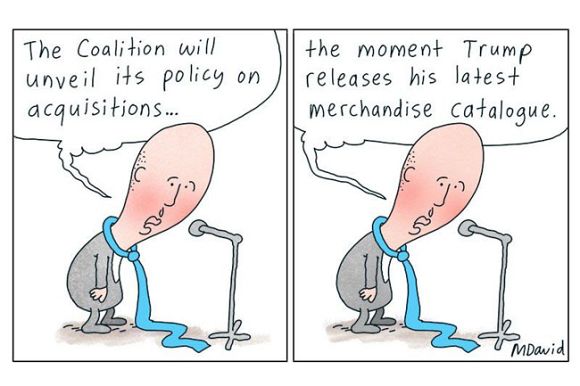Opposition Leader Peter Dutton says he wants to increase government efficiency but beyond wanting to cut public servant numbers, he won’t tell us how until after the Election.
We all want the government to be more efficient, to deliver higher quality government services and to enforce well-designed and targeted regulations at the lowest cost.
But mindless, ideological cutting of public servant numbers, as Elon Musk and President Donald Trump are pursuing in America and as Dutton delivered when he was Home Affairs Minister, can only deliver disasters that ultimately cost the taxpayer more and create all sorts of problems for the public.
There have been five main methods of cutting public servant numbers that Coalition governments obsessed with reducing the size of government have pursued — mostly with appalling results.
The most favoured approach is the privatisation of government functions, both privatisation of government business enterprises or functions delivered by public servants. These are often encouraged by business lobby groups eager for an opportunity for their members to make easy money.
The most recent examples of the former were the sale of Medibank Private by the Abbott Government following John Howard’s wasteful private health insurance subsidy system and the sale of Telstra by Howard.
The latter brought in short-term revenue to help Howard deliver his budget surpluses while creating much larger costs to the taxpayer associated with buying back the copper network from a privatised Telstra so that Australia could get fast broadband. It was one of Howard’s greatest long-term disasters — one of many.
In terms of functions delivered by public servants, the privatisation of the Commonwealth Employment Service (CES) to create the Job Network in 1998 (now known as Workforce Australia) was another of Howard’s abject failures. Repeated inquiries have highlighted its manifold costly problems.
The latest Parliamentary Inquiry in 2022 found:
…that Australia no longer has an effective coherent national employment services system; we have an inefficient outsourced fragmented social security compliance management system that sometimes gets someone a job against all odds. The system does not effectively serve jobseekers or engage service partners and it is overly focused on supply (jobseekers) rather than demand (employers). Government must be far more actively involved with a public sector core to a rebuilt system.
A second more gradual form of reducing public servant numbers is to replace them with private sector contractors. This is most common with I.T. work or call centre operations where often public servants have been made redundant only to come back very quickly as contractors supplied by labour hire companies. Most I.T. areas in government agencies are now dominated by private sector contractors essentially doing the same work as public servants but at a much higher cost.
A third approach to cutting public servant numbers, one which is rarely used, involves genuine re-design of program delivery to achieve greater efficiency and cut public servant numbers. But unless done properly, this can also go horribly wrong.
The best example of this was Robodebt which was blatantly illegal but was in theory was designed to recover social security payments through blind application of an algorithm thus also enabling a reduction in public servant numbers.
The Royal Commission into Robodebt found that:
‘…it is remarkable how little interest there seems to have been in ensuring the Scheme’s legality, how rushed its implementation was, how little thought was given to how it would affect welfare recipients and the lengths to which public servants were prepared to go to oblige ministers on a quest for savings.’
A fourth approach is to use hugely expensive consultants (and sometimes very junior ministerial staff) rather than trained public servants to help with policy development. The Coalition is very proud to have gutted the public service as a source of policy advice. That has repeatedly come back to bite both governments and Australians more generally.
The best-known example was the use of Pricewaterhouse Coopers (PWC) with development of tax law. That not only didn’t improve tax laws but actually enabled PWC to use the secret data it collected from the Australian Tax Office (ATO) to help its private sector clients avoid tax.
The fifth and most insidious approach is to either increase the efficiency dividend (an arbitrary cut in running costs including salaries) and/or cap staff numbers despite growth in demand for services. Using this approach, the Coalition could deny any responsibility for the consequences arguing that it was public servants who decided where to cut.
A good example was to reduce staff processing veteran claims leading to a massive backlog. In the short term, this not only saved money in salaries but also saved money in payments to veterans. But that could not be sustained for long as veterans have a legal entitlement to these payments which means the backlog had to eventually be cleared (by hiring more public servants to clear the backlog).
Dutton’s own record in cutting public servant numbers
While he says he knows how to cut public servant numbers by tens of thousands, Dutton will not provide the details until after the Election. He also says he will not cut frontline staff even though the bulk of the increase in public servants in recent years has been frontline staff who deal directly with the public.
We can get some insight into Dutton’s likely approach by looking at his time as Home Affairs Minister. From that, he certainly should have learned what not to do.
For a period, Dutton tried to privatise the visa I.T. system by selling it to one of two possible consortiums — one was closely associated with the Liberal Party and Prime Minister Morrison. The jobs of around 2,000 public servants were on the line as well as massive profits for whoever won the tender. The winning tenderer would have been in a position to hold the government to ransom on the design and delivery of visas.
After much parliamentary debate, acting Immigration Minister Alan Tudge finally saw the idea for the nonsense that it was and aborted the sale.
But it’s still possible Dutton has learned nothing from past privatisations and attempted privatisations and could be convinced by some self-interested group to try some more.
The only significant attempt at policy re-design that Dutton pursued as Home Affairs Minister was the abolition of the former Subclass 457 skilled temporary visa and its replacement with the new Subclass 482. All that achieved was to add massive levels of cost and bureaucracy to the visa for zero benefit.
Because Dutton had no interest in adding staff to deal with the more complex visa, a huge backlog built up that Dutton’s successors had to address as they were being attacked by a multitude of business lobby groups.
Dutton’s mess was finally addressed with the development of the new Skills in Demand visa that has adopted many of the characteristics and objectives of the former Subclass 457 that Dutton abolished.
Where Dutton created the greatest long-term cost was through sheer neglect. From 2015-16, a massive labour trafficking scam started by abusing the asylum system. Such scams have been common in the past with the former Department of Immigration acting quickly to process the visa applications rapidly and deal with the organisers.
But in this instance, Dutton and Secretary Mike Pezzullo appear to have done little to nothing. The ongoing reduction in visa processing and immigration compliance staff meant the labour traffickers were able to continue to ply their trade with impunity.
That led to the development of a massive backlog of asylum applications, the likes of which we have never before seen and continues to this day. Dealing with that will cost a fortune and take many, many years.
Cutting public servant numbers when faced with a crisis will only make the crisis into a disaster. Has Dutton learned his lesson from that? I doubt it.
Dr Abul Rizvi is an Independent Australia columnist and a former Deputy Secretary of the Department of Immigration. You can follow Abul on Twitter @RizviAbul.
Support independent journalism Subscribe to IA.
Related Articles












